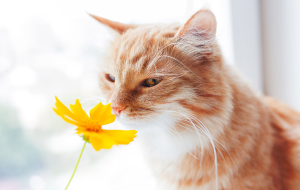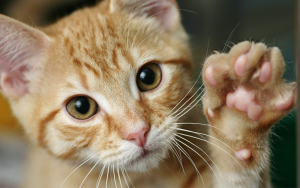How Long Do Cats Live? A Comprehensive Guide to Feline Lifespan and Health

When adopting a cat, one of the most common questions pet owners ask is, “How long do cats live?” The lifespan of a cat depends on various factors such as breed, health, diet, lifestyle, and environment. While some cats live well into their teens or even
early twenties, others may experience a shorter lifespan due to underlying health conditions, accidents, or genetic predispositions.
In this article, we’ll explore the average lifespan of cats, the factors that influence their longevity, and what you can do to ensure your feline friend lives a long, happy, and healthy life.
The Average Lifespan of Cats
On average, indoor cats live between 12 to 16 years. However, some cats can live into their 20s, and there are even documented cases of cats reaching their 30s. Outdoor cats generally have a shorter lifespan
due to increased risks, such as accidents, predators, and exposure to diseases. Outdoor cats typically live between 5 to 7 years, though this can vary depending on their environment and the level of care they receive.
Factors That Influence a Cat’s Lifespan
Several factors affect how long a cat will live. These include genetics, diet, lifestyle, and veterinary care. Below are the most important elements that can influence your cat’s longevity.
1. Breed
The breed of your cat can significantly influence its lifespan. Some breeds are predisposed to certain genetic conditions, while others have a reputation for being particularly long-lived.
- Siamese Cats: Known for their affectionate nature and sleek appearance, Siamese cats tend to live longer, with an average lifespan of 15 to 20 years.
- Maine Coon Cats: One of the largest domesticated cat breeds, Maine Coons can live up to 12 to 15 years, but some can reach 20 years or more with proper care.
- Persian Cats: Persian cats are generally known for their calm temperament and luxurious coats. They have a lifespan of around 12 to 17 years, although they are susceptible to certain health problems like kidney disease.
- Sphynx Cats: Despite being a hairless breed, Sphynx cats are generally healthy and can live anywhere from 12 to 16 years, sometimes longer with good care.
2. Diet and Nutrition
What your cat eats plays a crucial role in its overall health and longevity. Proper nutrition helps maintain a healthy weight, strong immune system, and a shiny coat. A poor diet can lead to obesity, diabetes, heart disease, and other health problems
that may shorten a cat’s life.
- High-Quality Cat Food: Ensure that your cat is eating a well-balanced diet that meets its nutritional needs, which vary depending on age, weight, and activity level.
- Portion Control: Overfeeding your cat can lead to obesity, which can reduce lifespan and quality of life. Always follow feeding guidelines and measure food portions carefully.
- Fresh Water: Always provide fresh water. Cats are notorious for not drinking enough water, but dehydration can lead to kidney issues and other health complications.
3. Indoor vs. Outdoor Living
Cats that live indoors generally live longer than outdoor cats. The risks of living outdoors include:
- Traffic Accidents: Cats who roam outside are at higher risk of being hit by cars.
- Predators: Wild animals, including dogs, foxes, and other predators, can pose a significant threat to outdoor cats.
- Infectious Diseases: Outdoor cats are more likely to contract diseases such as feline leukemia (FeLV) and feline immunodeficiency virus (FIV) through contact with other cats or wildlife.
- Parasites: Outdoor cats are more likely to pick up parasites like fleas, ticks, and worms, which can lead to serious health issues.
Indoor cats, on the other hand, are protected from these dangers, which contributes to their longer lifespans. However, it is important to create a stimulating environment for indoor cats to keep them mentally and physically healthy.
4. Veterinary Care
Routine veterinary check-ups are essential for ensuring your cat’s health and longevity. Regular vet visits help catch health issues early, before they become serious problems.
- Vaccinations: Keeping your cat up-to-date with vaccinations is essential for preventing common diseases such as rabies, feline distemper, and upper respiratory infections.
- Spaying/Neutering: Spaying or neutering your cat can contribute to a longer, healthier life by reducing the risk of certain cancers and infections.
- Dental Care: Dental disease is a common issue in older cats, and it can lead to heart disease, kidney problems, and other complications if left untreated. Regular dental check-ups and home care, such as brushing your cat’s teeth,
can help prevent these issues.
5. Exercise and Mental Stimulation
Cats, especially indoor cats, require both physical and mental stimulation to stay healthy. Lack of exercise can lead to obesity and muscle atrophy, while boredom can result in stress and behavioral problems.
- Playtime: Engage your cat in daily play with toys to help burn off energy and maintain physical fitness. Interactive toys and puzzles can also stimulate your cat’s mind.
- Climbing Opportunities: Cats are natural climbers, so providing cat trees or shelves for climbing helps them maintain muscle strength and mental alertness.
- Companionship: Some cats thrive with the company of other pets or humans. If your cat is particularly social, consider adopting another cat or providing extra attention if you’re away for long periods.
6. Environmental Factors
The environment your cat lives in can also impact its lifespan. Factors such as cleanliness, safety, and a calm atmosphere play a role in how your cat ages.
- Stress-Free Environment: Cats that live in a low-stress environment tend to be healthier. Stress can lead to a weakened immune system and contribute to behavioral issues.
- Climate: Extreme temperatures—whether too hot or cold—can affect your cat’s health. Ensure your home is a comfortable temperature for your cat, especially during extreme weather conditions.
Common Health Issues That Can Affect Lifespan
Certain health problems are more common in cats as they age, and these can impact their lifespan if not managed properly.
- Kidney Disease: Chronic kidney disease (CKD) is common in older cats. Early detection and proper management, including dietary changes and medication, can help extend a cat’s life.
- Hyperthyroidism: This condition, in which the thyroid gland becomes overactive, is prevalent in older cats. It can cause symptoms such as weight loss, increased appetite, and hyperactivity. With treatment, many cats can live a normal
life.
- Diabetes: Diabetes is another common condition in older cats, particularly those who are overweight. Managing diabetes with insulin injections and dietary changes can improve a cat’s quality of life.
- Arthritis: Cats can develop arthritis as they age, causing pain and reduced mobility. Treatment options include pain management, joint supplements, and physical therapy.
How to Ensure a Longer, Healthier Life for Your Cat
While genetics play a significant role in your cat’s lifespan, there are several things you can do to ensure they live a long, healthy life:
- Provide High-Quality Nutrition: Feed your cat a balanced, species-appropriate diet, and avoid feeding them harmful human foods.
- Regular Vet Check-Ups: Schedule annual or bi-annual check-ups with your vet to catch any health issues early.
- Create a Safe, Stimulating Environment: Keep your cat indoors as much as possible and provide toys, scratching posts, and climbing structures.
- Monitor Health and Behavior: Keep an eye on any changes in your cat’s behavior, weight, or appetite, and seek veterinary advice if needed.
- Exercise and Play: Make sure your cat stays active with daily play and exercise, especially if they are indoors.
Conclusion
The question, “How long do cats live?” does not have a one-size-fits-all answer, as the lifespan of a cat depends on numerous factors. Indoor cats typically live longer than outdoor cats, with an average lifespan of 12 to 16 years. Breed, diet, exercise,
and veterinary care all contribute to your cat’s overall health and longevity. By providing your cat with proper nutrition, a safe environment, regular veterinary check-ups, and plenty of love and attention, you can help ensure that your feline companion
enjoys a long, fulfilling life by your side.
By understanding the various factors that influence a cat’s lifespan, you can take proactive steps to ensure that your cat stays healthy and happy for many years to come.







